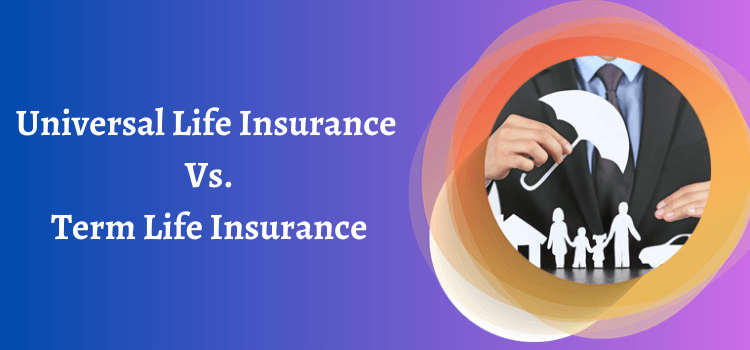Two well-known life insurance types are term and universal life insurance. Each offers your loved ones financial protection by paying them a substantial death benefit if you pass away during the policy term.
Your loved ones can use the death benefit to replace your income, pay off debts, and set aside funds for future expenses. However, their similarities end there. Each policy type differs in numerous factors, including premium costs, death benefit flexibility, term lengths, and wealth-building potential. This article will explain universal and term life insurance, then dive into their key differences to help you choose the best policy for your needs.
What is universal life insurance?

Universal life insurance is a type of permanent life policy that provides lifelong coverage. In addition to the death benefit, it also comes with a cash value growth component. Some of each premium goes into this component, which grows tax-deferred based on market rates.
You can withdraw or borrow from this cash value when it grows large enough. Additionally, you can receive the full cash value minus surrender charges if you surrender your policy. The cash value can also be used to pay premiums when there’s enough available.
What is term life insurance?
Term life insurance is a policy type that lasts for a set period of 10 to 30 years, depending on your choice. Like universal life insurance, this policy comes with a death benefit that can provide financial security to beneficiaries in the event of your passing. Since this is a temporary policy, you must renew it when it expires to continue coverage, but premiums are often more affordable than permanent life policies like universal life insurance.
Differences between Universal and Term life insurance
Here are four key differences between universal life insurance and term life insurance:
Premiums
Universal life insurance policies often charge more in premiums than term life insurance. According to Forbes, a healthy, non-smoking, 30-year-old male will pay $3,943 per year for a $1 million universal life insurance policy. Meanwhile, a 30-year, $1 million term life insurance policy for the same 30-year-old healthy, non-smoking male would cost about $780 per year.
Death benefit
Term life insurance death benefits are fixed once you get a policy. On the other hand, universal life insurance lets you adjust the death benefit within reason. For example, you can lower your death benefit to reduce your premiums. You can also increase your death benefit by paying more in premiums and, in some cases, taking a new medical exam.
Term length
Term life insurance eventually expires. You can typically get a term length of up to 30 years, but you’ll have to renew your policy or get a new one to continue coverage if you outlive the policy. Universal life insurance, on the other hand, lasts for a lifetime. You won’t lose coverage as long you keep up on premiums and avoid any other actions that could cause your policy to lapse.
Cash value
As mentioned before, universal life insurance comes with a cash value that, when large enough, you can withdraw from or borrow against at low rates and an indefinite term length. Universal life insurance also lets you use your cash value to pay for your premiums when it’s large enough. However, your policy can lapse if the cash value shrinks too much. Finally, you receive this cash value minus surrender charges if you surrender your policy.
You may be wondering, “Does term life insurance have a cash value component?” Term life insurance has no cash value. This means that policyholders can’t build wealth through term life insurance policies.
Which type of life insurance is right for me?
Term and universal life insurance can both offer your loved ones significant financial protection. However, their distinct features different policyholders. Term life insurance lasts up to 30 years and has no cash value, so it doesn’t offer lifelong coverage or wealth-building options. However, premiums are low, and the policy is quite simple. So, term life insurance can work well for budget-conscious people without complex financial needs.
On the other hand, universal life insurance is more complex and costs more. However, coverage lasts for a lifetime, the death benefit is flexible, and the cash value offers the opportunity to build wealth. These policies may be better if you want lifelong coverage and have complicated financial needs and a larger life insurance budget. Regardless of the type you choose, you can save money by getting quotes from multiple insurers. This helps you compare quotes to find the best rates on the coverage you need.






Leave a Reply